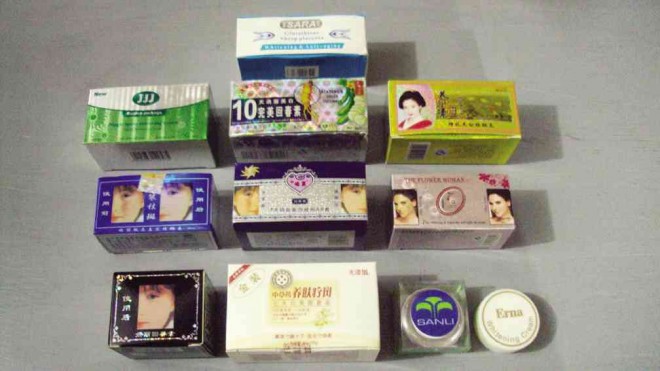
Samples of the beauty products that tested positive for high levels of mercury and that were bought in stores in Manila, Parañaque and Pasay EcoWaste Coalition/ contributed photo
MANILA, Philippines—An environment and consumer safety watch group on Sunday revealed that 10 brands of imported skin whitening creams banned by the Food and Drug Administration (FDA) continue to be sold in Metro Manila.
At the same time, EcoWaste Coalition warned school officials not to give out medals and trophies tainted with lead to outstanding graduating students.
The toxics watch group issued the warning against dangerous whitening creams after it tested the beauty products made in China, Hong Kong, Taiwan, Indonesia and Malaysia, which it bought from several stores in Parañaque, Manila and Pasay.
EcoWaste said that one of the beauty products worth P60 to P180 each contained as much as 15,900 parts per million (ppm) of mercury, way beyond the 1 ppm mercury threshold limit set under the Association of Southeast Asian Nations Cosmetics Directive.
Among the banned skin products still being sold in the market were Yu Dan Tang Ginseng and Green Cucumber 10 days whitening Speckles Removed Essence, which had 15,900 ppm of mercury; Erna Whitening Cream with 10,400 ppm of mercury; and Jiaoli 7 days Specific Eliminating Freckle AB set with 3,664 ppm of mercury.
EcoWaste was also able to buy from the stores the following: Flower Woman 7 Days Whitening & Spot Day & Night Set Cream, S’zitang cream, Jiaoli Miraculous Cream, Sara Glutathione Sheep Placenta Whitening & Anti-Aging Cream, JJJ Magic Spots Removing Cream, Jiaoli 10 Days Specific Eliminating Freckle Cream and Sanli Eliminating Freckle Cream.
On the other hand, Mifton 7 Days Beauty Freckle Whitening Repair Set cream, which is not on the FDA list, yielded 4,587 ppm of mercury when it was analyzed by the group using an X-ray fluorescence analyzer.
According to EcoWaste national coordinator Aileen Lucero, “the ruthless sale of these cosmetics loaded with mercury goes against the basic right of consumers to be protected against hazards to health and safety. Pregnant women and young children are most at risk to the adverse effects of mercury.”
She pointed out that according to the World Health Organization, mercury in skin lightening creams and soaps can harm the kidneys, cause skin discoloration, irritation and scarring and weaken dermal resistance to bacterial and fungal diseases.
Consumers’ rights violated
Lucero added: “The incomprehensible product labels in Chinese characters, the nondisclosure of mercury content, the misleading beauty enhancement claims, the lack of legal redress and the eventual contamination of the environment further violate the consumer bill of rights.”
Lucero urged consumers to protect themselves against mercury poisoning by buying only duly registered, properly labeled and nontoxic cosmetics.
She also advised women to make sure they were safe from mercury-laden skin whitening products by accepting the skin tone they were born with.
Meanwhile, EcoWaste also warned school administrators and teachers against giving student achievers medals and trophies sold in some stores in Manila after these were found laced with lead-tainted paint.
Last week, the group bought samples of medals and trophies from wholesale and retail stores on Juan Luna Street in Divisoria and Evangelista and Ronquillo Streets in Quiapo.
In a statement, EcoWaste said they decided to probe the substances found in medals and trophies given to students in appreciation of their academic, artistic, sporting and other accomplishments because these sell briskly during graduation time.
“Medals and trophies are special tokens of recognition for the students’ exemplary curricular or extracurricular achievements and should be safe from harmful substances such as lead, a toxic chemical that is known to damage the brain, reduce intelligence, stunt development and growth and cause behavioral problems,” said EcoWaste Project Protect coordinator Thony Dizon.
Of the 10 medals purchased by the group costing P13.50 to P55 each, EcoWaste found out that the paint used in these medals had a lead content between 5,965 ppm and 39,500 ppm, way above the 90 ppm threshold limit for lead in paint set by the Department of Environment and Natural Resources.
“The paints used on the three trophies we bought were likewise found to contain lead in the range of 5,458 ppm to 11,500 ppm,” it said.
Environment Secretary Ramon Paje said in a statement that exposure to lead, a highly toxic ingredient, may severely damage the nervous system.